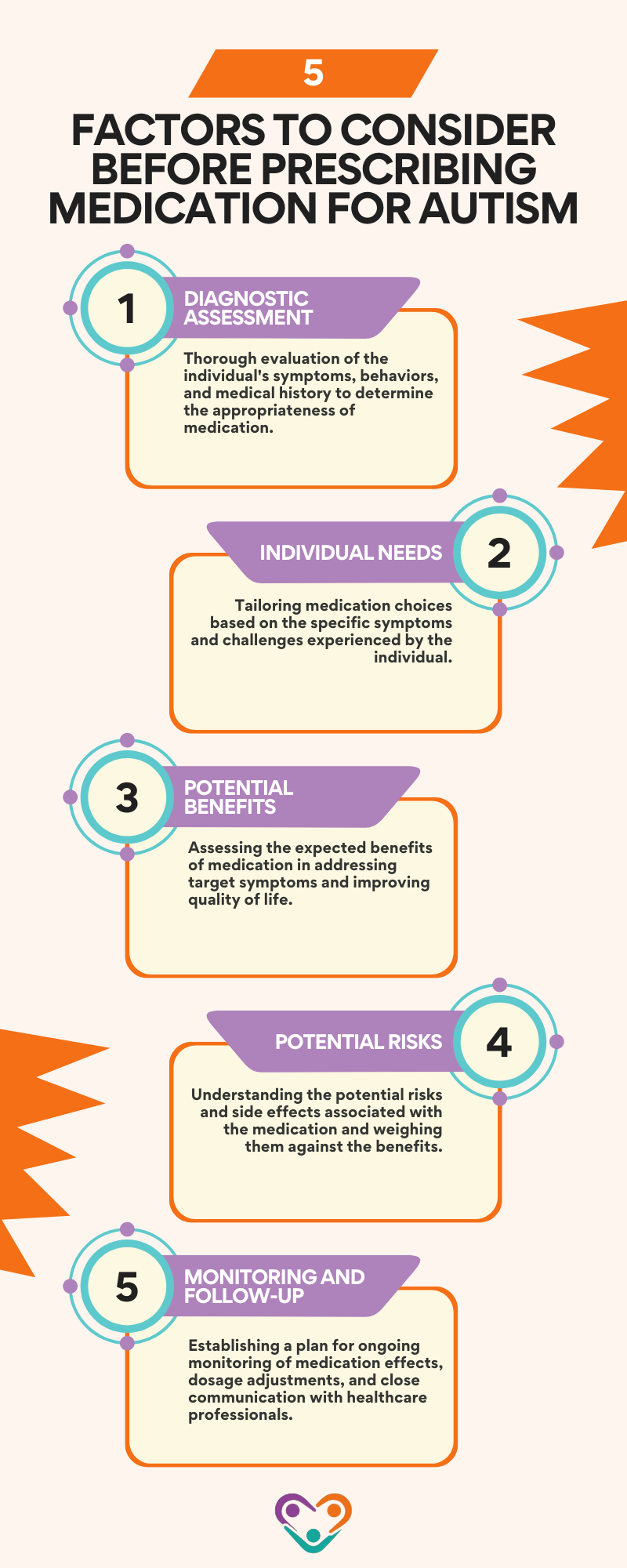
Table of Contents
Before starting any medication for autism, it’s important to understand the role these treatments can play. While medicine doesn’t “cure” autism, certain prescriptions may help manage specific symptoms, making daily life a little smoother.
Whether it’s addressing issues like anxiety, attention, or sleep difficulties, knowing what to expect can help make informed decisions. Every person with autism is unique, so what works for one may not work for another.
As such, it’s essential to weigh the pros and cons, and explore all options with a healthcare professional before moving forward.
Medication for Autism
Medication plays a significant role in managing certain symptoms and behaviors associated with autism. Understanding the role of medication in autism therapy and the factors that are carefully considered before prescribing medication is crucial in providing effective care for individuals with autism.
Medication in the treatment of autism is primarily focused on addressing specific symptoms and behaviors that may interfere with daily functioning and quality of life. While medication does not target the core characteristics of autism, it can help alleviate associated challenges such as:
- Aggression
- Hyperactivity
- Anxiety
- Repetitive behaviors
- Irritability
- Attention deficits
It’s important to note that medication should be part of a comprehensive treatment plan that may also include behavioral therapies, educational support, and other interventions tailored to the individual’s needs.
Before initiating medication for individuals with autism, several factors are carefully evaluated to ensure safe and effective treatment. These considerations include:

Taking these factors into consideration lets healthcare providers prescribe medications that are best suited to the individual’s unique needs and provide the necessary support and monitoring to optimize treatment outcomes.
It is essential to approach medication for autism with a comprehensive understanding of the individual’s symptoms, preferences, and overall well-being to promote positive results in their treatment journey.
Common Medications for Autism
As mentioned earlier, medications can play a role in managing certain behaviors and challenges among autistic individuals. With that in mind, here are some common medications that are commonly prescribed to individuals with autism:
Selective Serotonin Reuptake Inhibitors (SSRIs)
SSRIs are a class of antidepressant medications that are sometimes used to treat symptoms such as anxiety and repetitive behaviors in autistic individuals. These medications work by increasing serotonin levels in the brain, which can help regulate mood and behavior.
Atypical Antipsychotics
Atypical antipsychotics are another type of medication that may be prescribed to individuals with autism to manage symptoms such as aggression, irritability, and mood swings.
These medications can help regulate dopamine and serotonin levels in the brain, leading to improvements in behavior.

Stimulants
Stimulant medications, commonly used in attention-deficit hyperactivity disorder (ADHD) treatment, may also be prescribed for individuals with autism who exhibit symptoms of hyperactivity, impulsivity, and inattention. These medications work by increasing dopamine and norepinephrine levels in the brain, improving focus and impulse control.
Understanding the role of these medications in managing symptoms of autism is essential for parents and caregivers. It’s crucial to work closely with healthcare professionals to develop individualized treatment plans that address the specific needs and challenges faced by individuals with autism.
Regular monitoring and adjustments to medication dosages should be conducted under medical supervision to ensure optimal outcomes.
How to Manage Medication
Medication management plays a critical role in ensuring the well-being of individuals with autism. Here, we’ll look at the importance of individualized treatment plans and the necessity of monitoring and adjusting medications as part of effective autism interventions.
Individualized Treatment Plans
Creating individualized treatment plans is essential in the management of medication for individuals with autism. Each person with autism presents unique challenges and needs, making personalized treatment approaches crucial for successful outcomes.
When developing a treatment plan, healthcare providers consider factors such as the individual’s age, symptoms, medical history, and coexisting conditions.
Tailoring medication regimens to the specific requirements of the individual helps optimize the effectiveness of the treatment while minimizing potential side effects. By taking into account the individual’s response to medication and adjusting the treatment plan accordingly, healthcare providers can address the diverse needs of individuals with autism and enhance their overall quality of life.
Monitoring and Adjusting Medications
Monitoring and adjusting medications is a continuous process that forms an integral part of medication management for autism. Regular monitoring allows healthcare providers to assess the effectiveness of the prescribed medications and identify any adverse reactions or side effects that may arise.
Healthcare providers closely monitor the individual’s response to medication, tracking improvements in symptoms and evaluating any changes in behavior or functioning. By maintaining open communication with caregivers and regularly reviewing the individual’s progress, healthcare providers can make informed decisions about adjusting medication dosages or exploring alternative treatment options as needed.
Below is a summary of the key aspects of medication management for individuals with autism:
- Individualized Treatment Plans: Customized approach based on individual needs and characteristics.
- Monitoring Medication: Regular assessment of effectiveness, side effects, and behavioral changes.
- Adjusting Medications: Modification of dosages or prescriptions based on response and observations.
The Bottom Line
In the end, deciding to use medicine for autism is a personal choice that should be made with care. It’s important to talk openly with your doctor, weigh the benefits and risks, and always keep your child’s unique needs in mind.
Remember, medicine is just one part of the puzzle, and when combined with therapies and support, it can help create a well-rounded plan for a happier and healthier life. For families looking for comprehensive therapy options, including ABA centers in New Jersey, New York, Georgia, and Indiana, professional support is within reach via Golden Care Therapy.
If you want to discuss how our personalized services can help meet your child’s unique needs and foster progress on their journey, then don’t hesitate to contact us today so we can get started.
Sources:
- What to Know Before Taking Medicine for Autism - October 4, 2024
- Is Risperidone Good for Autism? - October 4, 2024
- Exploring Glutathione Supplementation in Autism - October 4, 2024
